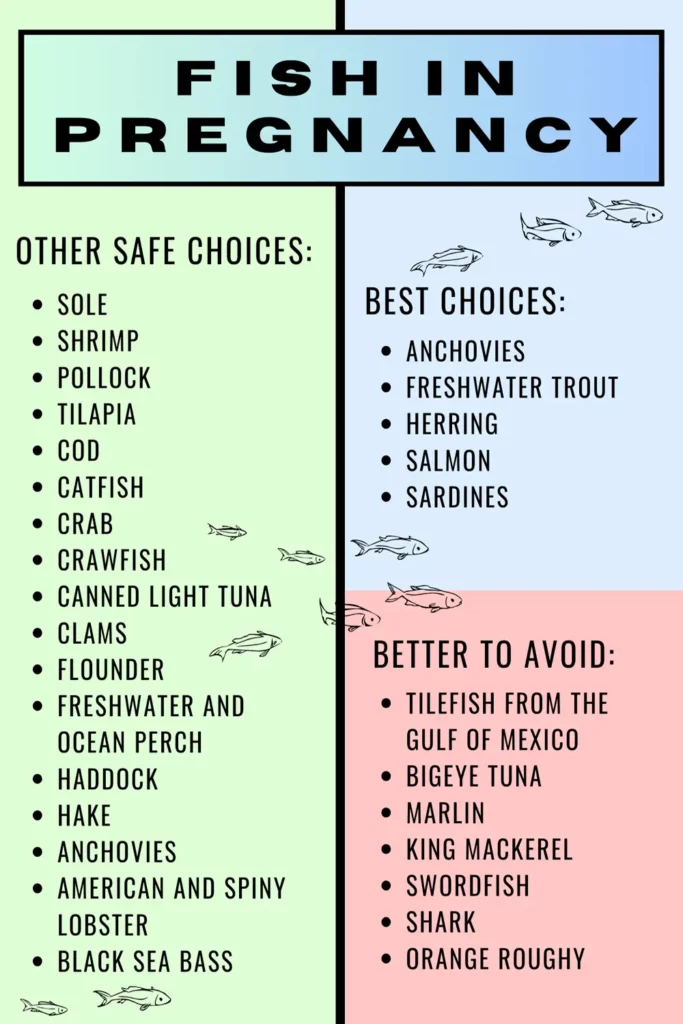Most fish are very healthy for pregnant women! They’re packed with nutrients, easy to digest, and low in calories. But can expectant mothers eat all types of fish?
Here’s what to know about eating fish while pregnant. It includes which to avoid and which are safe to eat up to three times a week.

Is Eating Fish While Pregnant Safe?
Fish is one of those foods that raises a lot of questions for pregnant women. While it’s generally very nutritious, some fish can contain toxic substances. Knowing which fish to avoid allows pregnant women to still enjoy a varied and healthy diet without the risks.
A well-balanced seafood diet can be very beneficial for both mother and baby. Fish are rich in omega-3 fatty acids, B vitamins, iron, and protein. These are vital for a strong immune system and the baby’s development in the womb.
It’s important for pregnant women to include fish in their diet, but they need to choose the right kinds. They should also pay close attention to where the fish comes from and make sure it’s cooked properly.
How to Safely Include Fish in Your Pregnancy Diet:
- Choose Low-Mercury Fish: Opt for species known to have lower mercury levels. (You can find lists of safe fish and fish to avoid during pregnancy below.
- Buy Fresh Fish from Reliable Sources: Ensure the fish is fresh and traceable to a trusted source.
- Proper Storage: Store raw fish in sealed containers in the fridge. Keep it away from cooked or ready-to-eat foods. Use fresh fish within two days or freeze it for longer storage.
- Use Safe Cooking Practices: Baking, grilling, broiling, or steaming are good options. Frying can also be effective if done at a safe temperature.
- Cook Thoroughly: Always cook fish at 145°F (63°C) to kill harmful bacteria and parasites. Fish should be opaque and flake easily with a fork when fully cooked.
- Limit Portions: Consume up to three servings of fish (4 ounces each) per week to maintain a balanced intake.
By following these guidelines, you can safely enjoy fish during pregnancy and reap the benefits they provide.
What Types of Fish Should You Avoid During Pregnancy?
All fish and shellfish contain small amounts of mercury, which usually isn’t a health concern. However, some fish, especially larger ones, have much higher mercury levels.
Larger fish tend to live longer, so they accumulate more mercury over time. They’re also predators, meaning they consume smaller fish. That further increases their mercury levels.
Larger, predatory fish can also carry other harmful substances, such as polychlorinated biphenyls (PCBs), radioactive materials, and heavy metals like cadmium, lead, and arsenic.
Pregnant women should steer clear of larger and predatory fish to reduce mercury exposure and keep their baby safe. Smaller fish, which are lower on the food chain, generally have less mercury. However, the environment where the fish are raised is also important, as polluted waters can lead to contamination.
Smaller and medium-sized fish are typically safer for expectant mothers.
Fish to Avoid During Pregnancy:
The FDA (Food and Drug Administration) recommends that pregnant women and young children avoid eating certain types of fish due to high mercury levels.
Types of fish with the highest mercury levels:
- Tilefish from the Gulf of Mexico
- Bigeye tuna
- Marlin
- King mackerel
- Swordfish
- Shark
- Orange roughy
Risks of Mercury Exposure During Pregnancy:
Exposure to high levels of mercury during pregnancy can cause serious problems for both the mother and the baby. Mercury is a toxic metal that can damage the developing baby’s brain and nervous system. It may also lead to hearing and vision issues in babies who were exposed in the womb.

Safe Fish to Eat During Pregnancy
Not only is it important to choose fish with low mercury content, but it’s also essential to ensure it’s cooked properly. All fish should be cooked to an internal temperature of 145°F (63°C) to kill any potential pathogens and parasites.
Avoid eating raw or undercooked fish, such as sushi (you can read more about sushi in pregnancy here), sashimi, carpaccio, tartare, or ceviche, during pregnancy. Pregnant women are more susceptible to foodborne illnesses, which can be very dangerous for their developing baby.
For example, while listeria might not cause severe issues in healthy adults, pregnant women are much more susceptible to infection. If this bacterium infects the fetus, it can lead to serious complications, including premature birth, miscarriage, or stillbirth. Babies born with listeria infections can also have other health issues.
Undercooked fish can also harbor parasites, such as Toxoplasma gondii or Anisakis worms. Freezing fish properly can kill parasites, but it does not eliminate all bacteria.
Best Fish to Eat During Pregnancy:
While all fish contain nutrients, the best options for pregnant women are those with the lowest mercury levels.
The safest fish, based on mercury content and high omega-3 fatty acids, include:
- Anchovies
- Freshwater trout
- Herring
- Salmon
- Sardines
Other safe choices include:
- Sole
- Shrimp
- Pollock
- Tilapia
- Cod
- Catfish
- Crab
- Crawfish
- Canned light tuna
- Clams
- Flounder
- Freshwater and Ocean Perch
- Haddock
- Hake
- Anchovies
- American and spiny Lobster
- Black sea bass
The FDA recommends that pregnant women eat 2 to 3 servings (4 ounces per serving) of these types of fish per week.
Benefits of Eating Fish During Pregnancy
As mentioned earlier, fish are a vital part of a healthy pregnancy diet, providing numerous benefits for both the mother and baby.
Fish are nutrient-dense and low in calories, which can help manage weight gain and maintain heart health. Their protein and omega-3 fatty acids support the baby’s growth and development.
Fish provide essential nutrients, such as:
- Protein: Important for energy, especially in the second and third trimesters, when fetal growth accelerates.
- Omega-3 fatty acids (DHA and EPA): Essential for the development of the baby’s brain and nervous system. If a pregnant woman doesn’t get enough omega-3s, her body may start using its own reserves, potentially leading to postpartum depression or premature birth. Babies lacking omega-3s may also have lower birth weights and slower growth.
- Vitamin B12: Maintains the health of the nervous system and supports mood, energy, and stress levels. It’s crucial for the development of the baby’s brain and spinal cord.
- Vitamin D: Plays a role in maintaining a strong immune system and aids in calcium and phosphorus absorption, supporting both fetal and maternal bone health. A deficiency can lead to preeclampsia, which is dangerous for pregnant women.
- Iron: Supports red blood cell formation, helps develop the placenta, and nourishes the growing baby. During pregnancy, blood volume increases significantly, which raises the need for hemoglobin synthesis and, therefore, iron. Mild anemia is common, but untreated severe anemia can lead to serious complications.
Conclusion:
Fish can be a healthy and delicious part of a pregnancy diet if chosen carefully. Opt for low-mercury fish, cook it properly, and enjoy the benefits of nutrients like omega-3s, protein, vitamins, and minerals. By following these guidelines, you can help support a healthy pregnancy and ensure your baby gets the best start possible.
